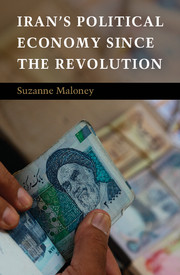Book contents
- Frontmatter
- Contents
- 1 Introduction
- 2 The Prelude: The Political Economy of Prerevolutionary Iran
- 3 The Economics of Upheaval, 1977–1980
- 4 The Cost of the Sacred Defense, 1980–1989
- 5 The Reconstruction Jihad, 1989–1997
- 6 Ayatollah Gorbachev: Reform within the Red Lines, 1997–2005
- 7 Populism, Version 2.0: The Ahmadinejad Era, 2005–2013
- 8 Energy and the Islamic Republic
- 9 Sanctions and the Sacred State
- 10 Conclusion
- Appendix
- Selected References
- Index
9 - Sanctions and the Sacred State
Published online by Cambridge University Press: 05 August 2015
- Frontmatter
- Contents
- 1 Introduction
- 2 The Prelude: The Political Economy of Prerevolutionary Iran
- 3 The Economics of Upheaval, 1977–1980
- 4 The Cost of the Sacred Defense, 1980–1989
- 5 The Reconstruction Jihad, 1989–1997
- 6 Ayatollah Gorbachev: Reform within the Red Lines, 1997–2005
- 7 Populism, Version 2.0: The Ahmadinejad Era, 2005–2013
- 8 Energy and the Islamic Republic
- 9 Sanctions and the Sacred State
- 10 Conclusion
- Appendix
- Selected References
- Index
Summary
The 1979 revolution was never simply about Iran: Its ambitions were explicitly transnational, and its demons – the forces that animated the movement and the state that it generated – always transcended Iran's borders. The revolutionaries harbored profound bitterness toward Washington and other major powers, as well as toward the international system that empowered them and sustained the monarchy; such sentiments have only been exacerbated by three and a half decades of international pressure. At the same time, as this book details, the Islamic Republic has remained intricately engaged with the global economy through its reliance on energy production and exports.
Revolutionary Iran's engagement with the international economy has been molded by a variety of factors: its historical legacy; the politics of protectionism; heavy-handed exchange rate management, which has facilitated imports and depressed nonoil exports; and of course Iran's prickly relations with the West. The country's trade patterns shifted considerably over time thanks to the Islamic Republic's policies, as well as in response to regional and global changes – the demise of the Soviet Union; conflicts in Lebanon, Iraq, and Afghanistan; the rise of Asian economies.
However, the revolution added a new factor – iernational economic restrictions – that has persisted and loomed ever larger in dictating new patterns of engagement with the world, and eventually reconfiguring the Iranian economy. From the initial measures undertaken after the 1979 embassy seizure to the mushrooming labyrinth of restrictions imposed after Iran's 2006 referral to the United Nations Security Council, understanding the sanctions regime – and Iran's responses to it – is critical to appreciating the political economy of the Islamic Republic.
SANCTIONS AND THE HOSTAGE CRISIS
The November 1979 embassy seizure achieved what the revolution itself had not – an immediate and abrupt transformation of the economic relationship between Tehran and Washington. The U.S. policy framework was established in the earliest hours after the embassy staff was taken hostage.
- Type
- Chapter
- Information
- Iran's Political Economy since the Revolution , pp. 428 - 490Publisher: Cambridge University PressPrint publication year: 2015



